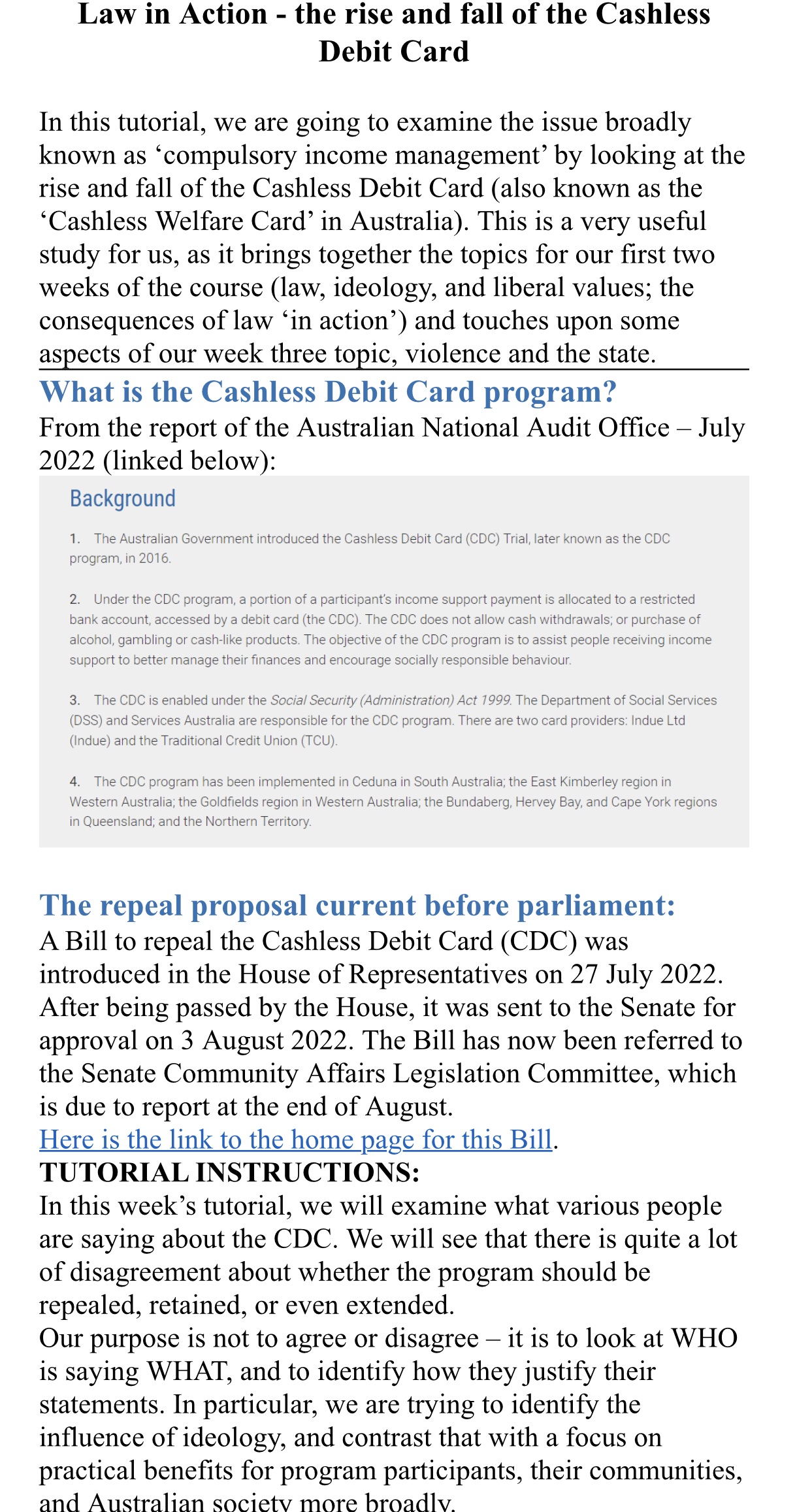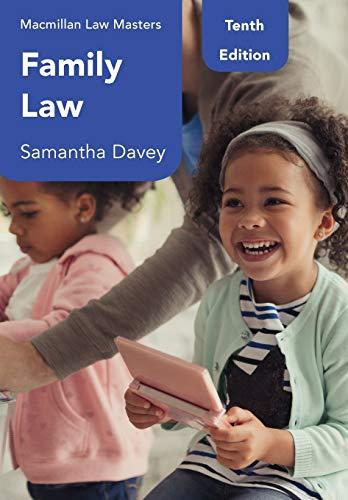Question
In this tutorial, we are going to examine the issue broadly known as 'compulsory income management' by looking at the rise and fall of the
In this tutorial, we are going to examine the issue broadly known as 'compulsory income management' by looking at the rise and fall of the Cashless Debit Card (also known as the 'Cashless Welfare Card' in Australia). This is a very useful study for us, as it brings together the topics for our first two weeks of the course (law, ideology, and liberal values; the consequences of law 'in action') and touches upon some aspects of our week three topic, violence and the state.What is the Cashless Debit Card program?From the report of the Australian National Audit Office - July 2022 (linked below): The repeal proposal current before parliament:A Bill to repeal the Cashless Debit Card (CDC) was introduced in the House of Representatives on 27 July 2022. After being passed by the House, it was sent to the Senate for approval on 3 August 2022. The Bill has now been referred to the Senate Community Affairs Legislation Committee, which is due to report at the end of August.Here is the link to the home page for this Bill.TUTORIAL INSTRUCTIONS:In this week's tutorial, we will examine what various people are saying about the CDC. We will see that there is quite a lot of disagreement about whether the program should be repealed, retained, or even extended.Our purpose is not to agree or disagree - it is to look at WHO is saying WHAT, and to identify how they justify their statements. In particular, we are trying to identify the influence of ideology, and contrast that with a focus on practical benefits for program participants, their communities, and Australian society more broadly.PART 1:1. who the author was and their position/qualifications/experiences that informed their commentary?2. What position where they talking with regards to the Cashless Debit Card?3. What arguments where they making to support their position and what evidence did they rely upon to substantiate their arguments?4. What liberalism values or ideas were being privileged with the authors position/perspective on the Cashless Debit Card?The purpose was to critically engage with a range of publications commenting on laws that restrict individual freedom and to connect various positions to liberal ideology. There was a lot of discussion on liberty, the harm principle, and whether the laws where justified by the prevention of harm. I am happy to chat about the tutorial if you would like. 1Academics writing brief articles in the Conversation - early days of CDCElise Klein 'The Cashless Debit Card causes social and economic harm - so why trial it again?' The Conversation 30 March 20172 Marcia Langton 'The Cashless Debit Card Trial is working and it is vital - here's why' The Conversation 4 May 20173The Minister telling us why her Government has introduced repeal legislation, and a response during question time from the Leader of the Opposition (no link for this one - this is the whole quote)Minister Rishworth's Media Statement here.4 Mr DUTTON (Dickson?Leader of the Opposition) (13:59): My question is to the Prime Minister. The coalition strongly supports the cashless debit card for welfare payments to working-age recipients where alcohol and drug are a problem. Research from the University of Adelaide showed that the cashless debit card led to a 21 per cent decrease in gambling and 45 per cent of people believed it had improved their lives. Prime Minister, to please the inner-city, woke audience you've abolished the card. As Jacinta Price points out, it will result in higher incidences of domestic violence and assault in Indigenous communities. Why make a bad situation worse?5Fact Check (sorry I couldn't find one for the Minister)RMIT ABC Fact Check 'Peter Dutton said the cashless debit card has improved the lives of many users. Is he correct?' Posted Fri 5 Aug 2022 at 6:08am6Policy briefing from a major community organisationSt Vincent de Paul Society 'Policy Briefing: Cashless Debit Card' updated February 20197Official audit reports - this is quite long, so focus on points 1 - 13 of the summary and recommendationsAustralian National Audit Office (ANAO), Performance Audit Report: Auditor-General Report No. 29 of 2021-22 'Implementation and Performance of the Cashless Debit Card Trial - Follow-on', published June 2nd, 2022

Step by Step Solution
There are 3 Steps involved in it
Step: 1

Get Instant Access to Expert-Tailored Solutions
See step-by-step solutions with expert insights and AI powered tools for academic success
Step: 2

Step: 3

Ace Your Homework with AI
Get the answers you need in no time with our AI-driven, step-by-step assistance
Get Started


